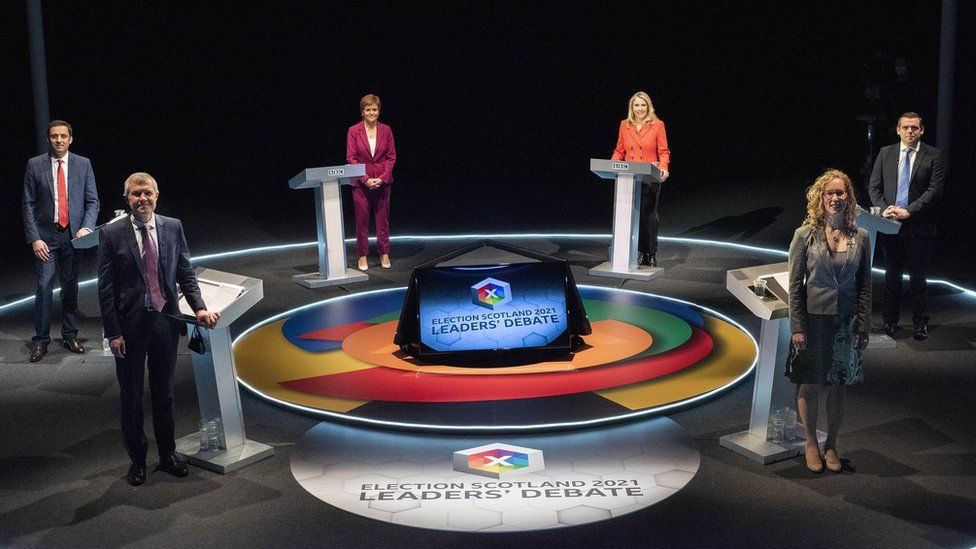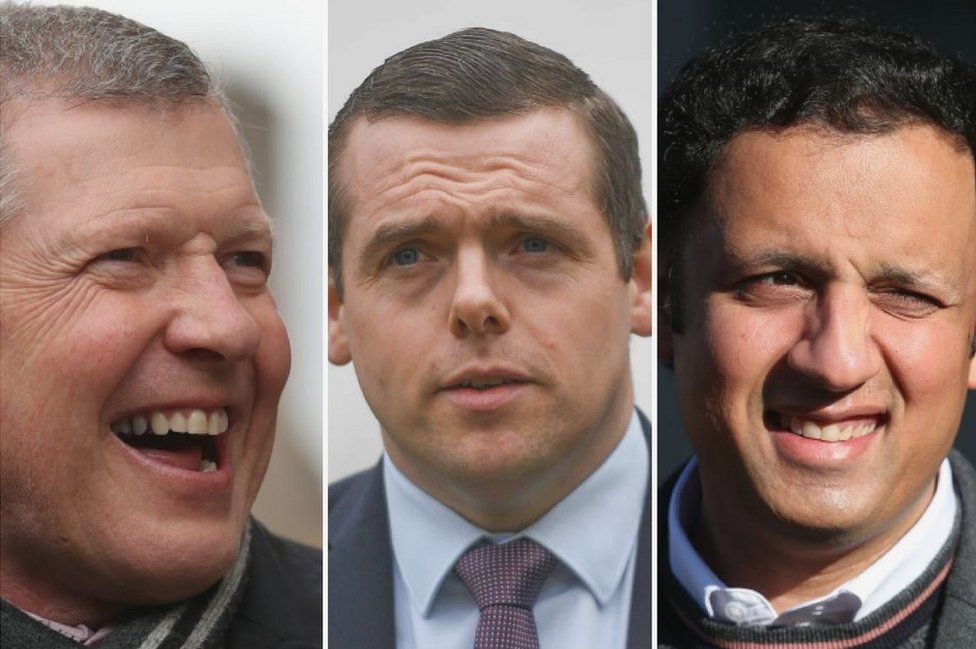
The Holyrood election campaign is in full flow ahead of voters going to the polls on 6 May. Nicola Sturgeon is hoping to continue as first minister, but what battles is she facing?

There are two bogeymen in Nicola Sturgeon's election campaign. One she chooses. The other she desperately wishes to be without.
Boris Johnson is her bogeyman of choice. His name has featured in at least 20 SNP news releases I have received in the last week.
Why? Because Mr Johnson is not very popular in Scotland and if the choice in this election was between his leadership and that of Ms Sturgeon, she would expect to win a landslide.
Of course, he is not a Holyrood candidate. But the SNP leader still finds him useful in making her case for another independence referendum when Covid eases.
She argues that Scotland should have the "right to choose between independence or Westminster governments led by the likes of Boris Johnson".
The framing of this choice infuriates many pro-UK politicians because Mr Johnson is, like any prime minister, only temporary whereas independence is for keeps.
They also think the success of the UK vaccination programme and Treasury support schemes like furlough help to make the case for Scotland's continued participation in the union.
Anyway, the SNP has co-opted Mr Johnson into their campaign just as the Conservatives have used Ms Sturgeon as their bogeywoman in the past.
'Negative messaging'
Think of those Tory billboards in 2015 featuring Nicola Sturgeon with the then Labour leader Ed Miliband in her pocket and the Daily Mail wondering if she was "the most dangerous woman in Britain".
It is commonplace for political campaigns to use a combination of this kind of negative messaging alongside what they consider the positive attributes of their own party's policies and personalities.
That much is within their control. Much else is not. And that's where Nicola Sturgeon's unwanted bogeyman comes in.
His name is Alex Salmond, the leader of the new pro-independence party, Alba.
Not only is his presence in this campaign a constant reminder of their toxic feud over harassment complaints, he is also competing directly with the SNP for votes on the regional lists.
Mr Salmond argues that if people back Alba in sufficient numbers it will harm pro-UK parties and help create a supermajority for independence in the next parliament.
The SNP fear it could split the nationalist vote, potentially costing them seats and the opportunity to secure an overall majority on their own.
Ms Sturgeon has criticised her former mentor, ally and friend as a "gambler" and questioned his suitability for office, insisting she has "no intention" of working with him after the election.

Initial polling (two samples) suggests that within a week of its formation Alba had the potential to attract between 3 and 6 percent support on the regional lists.
At the upper end of that scale they would be expected to start winning seats under Holyrood's more proportional voting system. If they fall much short of that they could get nothing.
'Awkward questions'
Having founded the gradualist step-by-step approach to independence as SNP leader, Mr Salmond now seems to have placed himself at the head of a new fundamentalism within the nationalist movement.
At a news conference on the 701st anniversary of the Declaration of Arbroath, Mr Salmond offered his own variation — that Scottish independence negotiations with the UK should begin within a week of the election if a large majority of MSPs support leaving the UK.
They do not necessarily think another referendum - which remains central to SNP thinking - would be required. Further differences over Scotland's currency options and approach to EU relations in the event of independence may follow.
Alba also seems to share the concern that gender self-identification could undermine women's rights, which sets them at odds with both the SNP leadership and the other independence supporting party at Holyrood, the Scottish Greens.
As their policy alternatives emerge, awkward questions for Nicola Sturgeon are likely to follow. She is more comfortable talking about another referendum in principle, rather than the nuts and bolts of independence.
While there are potential dangers in Mr Salmond's attempt at a political comeback for all parties, there is an upside for the Scottish Conservatives.
With Alba in the campaign, independence - the Tories' bogeyman of choice - is sure to remain prominent in the debate. That's something the Tories are keen on, to help motivate their unionist base.

The Scottish Tory leader, Douglas Ross, has perhaps less to gain from making Boris Johnson a big part of his campaign, although he has confirmed the prime minister will play a part.
Recent opinion polling suggests the only political leader less popular in Scotland than Mr Johnson is Mr Salmond. His negative ratings may limit his new party's potential to make inroads.
Douglas Ross declared himself sufficiently concerned about the emergence of Alba to re-issue an invitation to Labour and the Liberal Democrats to join him in a unionist alliance.
Both parties rejected his offer with Labour's Anas Sarwar accusing him of "petty game playing" and the Liberal Democrats' Willie Rennie describing Tory politics as "too dark and divisive".
The Lib Dems have not recovered from their five years in coalition with the Conservatives at Westminster and Scottish Labour bears the scars of its participation with the Tories in the Better version and Together campaign in 2014.
In this election, Mr Sarwar wants to beat the Tories into third place rather than campaign alongside them. The conflict between him and Mr Ross generated some of the sharpest exchanges in the BBC leaders' debate.
Independence may be the Conservative's bogeyman of choice but a revived Scottish Labour Party under Anas Sarwar could be the cause of some sleepless nights for Tory strategists.
They'll also want to keep an eye on George Galloway's Alliance for Unity party and what was the Brexit party - now Reform UK - competing for unionist votes on the regional lists.
In election 2021, beware the bogeymen.

- BASICS: A really simple guide to the election
- POLICIES: Who should I vote for?
- POLLS: 'Intense battle' for every vote
- PODLITICAL: Updates from the campaign

https://news.google.com/__i/rss/rd/articles/CBMiQWh0dHBzOi8vd3d3LmJiYy5jby51ay9uZXdzL3VrLXNjb3RsYW5kLXNjb3RsYW5kLXBvbGl0aWNzLTU2NjQ4NjE20gFFaHR0cHM6Ly93d3cuYmJjLmNvLnVrL25ld3MvYW1wL3VrLXNjb3RsYW5kLXNjb3RsYW5kLXBvbGl0aWNzLTU2NjQ4NjE2?oc=5
2021-04-06 21:55:18Z
52781494027049
Tidak ada komentar:
Posting Komentar